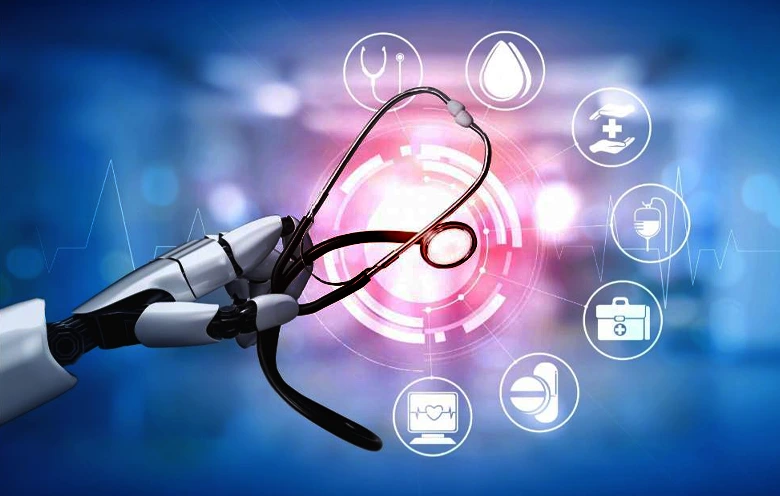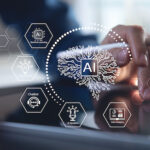A Top Blogger’s In-Depth Look at Artificial Intelligence in Medicine in 2025, Beyond the Hype
The world of medicine is about to change in the most important way since penicillin was discovered in 2025. This revolution isn’t just happening in a clean lab with petri dishes and microscopes. It’s happening in the quiet hum of servers, the complicated dance of algorithms, and the digital bits and bytes of data. We’re talking about the rise of AI in healthcare, a force so strong that it is changing the rules of how we diagnose and treat diseases and how we think about human biology itself.
As a writer who has spent more than ten years tracking how technology changes things, I can tell you that the use of artificial intelligence in medicine is not a far-off science fiction fantasy. It’s here, right now. It’s making our best doctors better, speeding up the search for drugs that can save lives, and giving patients more personalized care than was possible just a few years ago. This is the newest area of medical technology, and it’s one of the most exciting and hopeful stories of our time.
But what does all of this mean for you? How does this advanced health tech AI really change the care you get at your local hospital or clinic? It’s not just about billion-dollar startups and data scientists. An AI co-pilot helps a radiologist find cancer earlier and more accurately. The story is about a diabetic patient getting a treatment plan that is really tailored to them based on their genes and way of life. It’s about using AI for doctors to cut down on stress and let them focus on what really matters: connecting with their patients.
In this deep dive, we’ll go beyond the headlines and look at how AI is actually being used in healthcare right now. We’ll look at how it’s making medicine more accurate, predictive, and participatory. We will also talk about the big moral issues and problems that come with this powerful new tool. So, let’s begin our rounds and explore how artificial intelligence is becoming medicine’s most powerful new instrument.
The All-Seeing Eye: AI’s Superhuman Role in Medical Diagnostics
A correct and timely diagnosis is the most important part of good medicine. For hundreds of years, this has depended on a doctor’s trained eye, experience, and ability to put together clues from a patient’s symptoms and tests. The human mind is amazing, but it can also make mistakes and has limits. This is where AI is having the biggest and most immediate effect.
AI algorithms, especially deep learning models, can learn from huge sets of medical images, like millions of X-rays, CT scans, MRIs, and retinal scans. The AI learns to find patterns, outliers, and the small signs of disease that people can’t see by looking at these pictures.
A New Co-Pilot for Radiology: Finding Cancer Sooner
Radiology is the area where the potential of AI in healthcare is most clear. A radiologist may look at hundreds of scans every day. This is a hard job that can make them tired, and the first signs of disease can be very hard to see.
How it Works: An AI system can be a helpful assistant that never gets tired. It can scan images ahead of time and mark areas that look suspicious for the radiologist to look at more closely. For instance, AI algorithms have shown that they can find breast cancer in mammograms with an accuracy that is equal to or better than that of human experts. A study in Nature showed an AI model that cut down on false positives and false negatives, which made diagnoses more accurate.
This isn’t about getting rid of radiologists. It’s about making them better. Imagine giving the doctor a special power. In this case, the “AI for doctors” takes care of the hard initial screening, which lets the human expert focus their diagnostic skills on the hardest cases and on talking to patients.
Tip for everyday life: If you or someone you care about has medical imaging done, don’t be afraid to ask if AI-assisted diagnostic tools were used. Knowing how the technology works that is used in your care can help you be a more informed and empowered patient. “How does this technology help you make a more accurate diagnosis for me?” Ask your doctor this.
Source Link: The Radiological Society of North America (RSNA) has a lot of information and news about the newest developments in AI for medical imaging. RSNA.org is their website, and it has a lot of useful information.
From Eyes to Skin: Making Dermatology and Pathology Available to Everyone
AI can diagnose things outside of the body as well.
- Dermatology: Researchers at Stanford University and other places have made AI models that can sort skin cancer into groups that are as good as dermatologists at doing so. A patient could use their smartphone to take a picture of a mole that looks suspicious, and an AI app could give them a first risk assessment and tell them if they need to see a specialist. This health tech AI could change the game for finding diseases early in communities that don’t have enough resources.
- Pathology: AI is helping to look at tissue samples on a microscopic level in pathology. AI can speed up a process that usually takes a long time by scanning slides and finding cancerous cells or other disease markers. This helps patients get their results and start treatment faster.
The Predictive Power: Seeing Disease Before It Hits
The most exciting new area for “artificial intelligence in medicine” might be its move from diagnosis to prognosis and prediction. AI models can start to figure out risk scores for different diseases by looking at a patient’s electronic health record (EHR), genetic data, and lifestyle factors.
As an example, Google’s health research division has made AI that can figure out how likely a patient is to have a heart attack or stroke just by looking at a scan of their retina. The AI could identify risk factors like high blood pressure or smoking status from the eye’s blood vessels, something a human doctor cannot do from the scan alone. This makes it possible to take action before a patient even has a symptom.
The Digital Alchemist: Speeding Up the Discovery and Development of New Drugs
It takes a long time, a lot of money, and a lot of failures for a new drug to go from an idea in a lab to your local pharmacy. It can take more than ten years and cost billions of dollars, and most drugs that go through clinical trials never make it to the market. AI is about to make a big difference in this situation.
Finding the Needle in a Haystack: Finding Drug Candidates
Scientists must first find a biological “target,” such as a specific protein that is involved in a disease, and then look for a chemical compound that can act on that target. This means looking at millions of possible compounds.
How AI Helps: AI can look at huge biological datasets and find promising targets that people might miss. Then, it can use predictive modeling to search through virtual libraries of chemical compounds to find the ones that are most likely to work and have the fewest side effects. This cuts down the number of candidates by a lot, so researchers can focus their lab work on the ones that are most likely to succeed. Atomwise and Insilico Medicine are two companies that are leading the way in this field. They use AI to find new possible treatments for diseases like cancer and Ebola.
Smarter Clinical Trials: Cutting Costs and Time
Even if a compound looks good, clinical trials are a big problem. Finding the right patients and setting up a good trial can be very hard.
How AI Can Help Make a Better Trial:
- Finding Patients: AI can go through millions of electronic health records to find patients who meet the exact requirements for a clinical trial. This used to take months of manual work.
- Trial Optimization: AI models can help make trials more efficient, guess which patients are most likely to respond to a certain drug, and even find “digital biomarkers” (like activity levels from a smartwatch) to keep track of how well a drug is working in real time.
This not only speeds up the process and lowers costs, but it can also make trials safer and more effective by making sure that the right patients get the right treatment.
Backlink: If you want to know what’s new in pharmaceutical research, Fierce Biotech is a great news source that often writes about the intersection of AI and drug development.
Medicine Made for One: The Beginning of Personalized Treatment
For most of medical history, treatment has been based on a model that fits everyone. A doctor diagnosed a disease and then gave a standard treatment based on what most people with the same disease get. But each of us is biologically different. For one person, a drug may work wonders, but for another, it may not work at all or cause serious side effects. AI in healthcare is the key that is finally opening the door to medicine that is truly tailored to each person.
Your Genes and Your Treatment Plan
Genomics, which is the study of a person’s entire DNA sequence and analysis, creates an almost unimaginable amount of data. It’s way too much for a person to look at and understand. But AI is very good at this.
How AI Personalizes Care: AI can help doctors by comparing a patient’s genetic information with huge databases of clinical data.
- Choose the Right Drug: This is already possible in cancer treatment. An AI can look at the genes in a patient’s tumor and suggest the best targeted therapy for them. This is a key part of precision medicine.
- Predict Drug Response: AI can guess how a patient will react to a certain drug and dose, which cuts down on the trial-and-error process and lowers the chance of bad reactions.
- Customize Lifestyle Suggestions: AI can look at data from wearables like Fitbits and Apple Watches and suggest personalized diet and exercise plans to help people with chronic conditions like diabetes or high blood pressure.
Useful Advice for Everyday Life: If you have a long-term illness, look into health apps that use AI to help you keep track of your symptoms, diet, and exercise. Diabetic patients now have more control over their health than ever before thanks to tools like continuous glucose monitors that work with AI-powered apps. Give this information to your doctor so you can talk about your treatment in a more informed way.
The AI Health Assistant Is Growing
Your smartphone is getting the next wave of health tech AI. AI-powered chatbots and virtual health assistants are available 24/7 to help with medical questions. They can help you check your symptoms, tell you about conditions, remind you to take your medicine, and even help you make an appointment.
These tools are not a replacement for a doctor, but they are a useful first source of information and support that can help ease the load on healthcare systems that are already stretched thin. Companies like Babylon Health and Ada Health are leading the way in this movement by putting a virtual health advisor in millions of people’s pockets.
AI and robots are the surgeon’s new partners in the operating room.
The operating room is a very important and precise place. AI and robotics are also working together here to set a new standard for surgical care. It’s important to be clear: we are not yet at the point where robot surgeons can work on their own. We are now in the age of robot-assisted surgery, where technology makes the surgeon’s job easier, but they are always in charge.
Improving Human Skill with Robot Accuracy
The da Vinci Surgical System is the most famous example. A surgeon sits at a console, which is usually in the same room, and uses a set of controls. The robotic arms can move very precisely and steadily inside the patient’s body through tiny cuts, thanks to these movements being sent to them in real time.
How AI Helps:
- Better Vision: AI can look at the video feed from the patient’s camera and give the surgeon a 3D, high-definition view. It can show important information on top of other things, like showing the edges of a tumor or the places where you should avoid major blood vessels.
- Tremor Filtration: The system gets rid of any natural hand tremors that the surgeon has, which makes their movements steadier and more accurate than what the human hand can do on its own.
- Data Analysis: AI can look at data from thousands of past surgeries to give the surgeon real-time advice and predictions about the best and safest way to do the surgery.
This medical technology makes procedures less invasive, which means patients have less pain, smaller scars, shorter hospital stays, and faster recoveries.
The Future: Self-Driving Actions and Simulated Surgery
Robotic surgery is likely to become more independent in the future. Researchers are working on systems that would let a surgeon do the most important parts of an operation and then let an AI-powered robot take care of simple, repetitive tasks like suturing.
AI is also changing the way surgical training is done. AI-powered virtual reality simulators let trainee surgeons practice difficult procedures in a safe, realistic setting and get feedback on how well they did before they ever touch a real patient.
The Human Element: Facing the Problems and Morality of Using AI in Medicine
There are a lot of problems and moral questions that come up when trying to use AI in healthcare, but the potential benefits are huge. We need to be careful, think ahead, and be fully committed to the health and safety of our patients as we rush to adopt this new technology.
The Black Box Problem and Algorithmic Bias
Some advanced AI models are hard to understand because they are “black boxes.” The AI can give a very accurate answer, but it can’t always explain how it got there. Doctors need to know why a diagnosis was made in order to take responsibility for it, which is a problem.
Algorithmic bias is an even bigger problem. AI models learn from data, and if that data shows biases that already exist in society and healthcare, the AI will learn them and even make them worse. For instance, if an AI is mostly trained on data from one group of people, it might not be as good at diagnosing people from other groups. One of the most important things that developers and regulators need to do is make sure that health tech AI is fair and equal.
Safety and Privacy of Data
A lot of sensitive patient data powers artificial intelligence in medicine. Keeping this information safe from breaches and abuse is very important. Patients need to know that their most private information is safe and that they can decide how it is used. Strong rules, like HIPAA in the US and GDPR in Europe, set the stage, but constant watchfulness and technological protections are also very important.
The Role of the Doctor in the Age of AI
A lot of people are afraid that “AI for doctors” will eventually mean that doctors will no longer be needed. Experts, on the other hand, all agree that this is very unlikely to happen. AI is a tool, not a replacement for human empathy, critical thinking, and the relationship between a patient and a doctor.
The hardest part is figuring out what the doctor’s new job will be. AI can do the data analysis and pattern recognition, which gives doctors more time to talk to each other, make decisions together, and do the things that only humans can do in care. The future doctor will not only be an expert in medicine, but they will also know how to work with smart systems to get the best results for their patients.
Source Link: The World Health Organization (WHO) has put out a lot of information about the ethics and governance of “artificial intelligence in healthcare.” This is a must-read if you want to understand how people around the world see these issues. You can get it from the WHO’s website.
The Final Prognosis: A Healthier Future, Guided by Intelligence
The use of AI in healthcare is not a far-off dream; it is a part of everyday life in medicine in 2025. Medical technology is changing patient care at every level, from the diagnostic co-pilot that helps your doctor find disease earlier to the digital alchemist that finds the drugs of tomorrow to the surgical robot that makes operations safer and less invasive.
We are changing from a reactive, one-size-fits-all model of medicine to one that is proactive, tailored to each person, and involves them. It’s a future where your treatment is based on your own biology, where diseases are caught before they can spread, and where smart tools give doctors the power to do their best work.
Yes, there are big problems that need to be solved, such as ethical, regulatory, and technical ones. We need to make these systems with fairness, openness, and a strong focus on keeping patients safe and private. But the path is clear. Combining human knowledge with artificial intelligence is creating a synergy that will help us all live longer, healthier lives. The digital scalpel is making its cut, and the future of medicine has never looked better.
Questions That Are Often Asked (FAQ)
Q: Will an AI take the place of my doctor?
A: It’s very unlikely. People think that the future of medicine will involve working together with AI tools and human doctors. AI will take care of tasks that require a lot of data, leaving doctors free to work on difficult problems, talk to patients, and show empathy—things that machines can’t do.
Q: How can I be sure that AI won’t misuse my health data?
A: This is a big worry. HIPAA and GDPR are two strict laws that healthcare organizations must follow when it comes to data privacy. Data is usually encrypted and made anonymous. Always read the privacy policy of any health app or service you are thinking about using to see how your data is being used and protected.
Q: Is an AI diagnosis as good as a diagnosis from a doctor?
A: AI has been shown to be just as reliable, and sometimes even more so, than people for certain, limited tasks, like looking at medical scans. But it doesn’t replace a doctor’s full diagnostic process, which looks at a lot of different things, like the patient’s history and a physical exam. Right now, it’s best to think of it as a strong second opinion or screening tool.
Q: How can I find out more about how AI is used in my own health care?
A: Take an active role in your care. Talk to your doctors and specialists about the tools they use. Look into your hospital or clinic system to see if they are working on precision medicine or AI-assisted diagnostics. You can also stay up to date by reading articles from well-known health news sites and major medical centers.
https://diolichat.rw/technology/aiartificial-intelligent
https://diolichat.rw/technology




